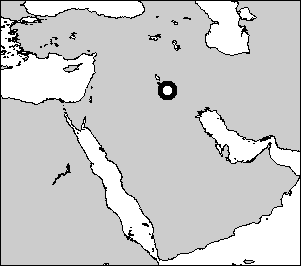
| www.CuriousTaxonomy.net |
|
The Flood in World Myth and Folklore
Middle East |
| © 2021 Mark Isaak |

The Atrahasis epic dates back at least to 1700 B.C.E.
Three times (every 1200 years), the gods were distressed by the disturbance from human overpopulation. The gods dealt with the problem first by plague, then by famine. Both times, the god Enki advised men to bribe the god causing the problem. The third time, Enlil advised the gods to destroy all humans with a flood, but Enki had Atrahasis build an ark and so escape. Also on the boat were cattle, wild animals and birds, and Atrahasis' family. When the storm came, Atrahasis sealed the door with bitumen and cut the boat's rope. The storm god Adad raged, turning the day black. After the seven-day flood, the gods regretted their action. Atrahasis made an offering to them, at which the gods gathered like flies, and Enki established barren women and stillbirth to avoid the problem in the future.
Stephanie Dalley, Myths from Mesopotamia (Oxford University Press, 1989), 9-38; W. G. Lambert and A. R. Millard, Atra-Hasis (London: Oxford, 1969).

The Gilgamesh Epic dates back to 2000 B.C.E., but the flood account, related here, is a later addition, first known from the seventh century B.C.E.
The gods, led by Enlil, agreed to cleanse the earth of an overpopulated humanity, but Utnapishtim was warned by the god Ea in a dream. He and some craftsmen built a large boat (one acre in area, seven decks) in a week. He then loaded it with his family, the craftsmen, and "the seed of all living creatures." The waters of the abyss rose up, and it stormed for six days. Even the gods were frightened by the flood's fury. Upon seeing all the people killed, the gods repented and wept. The waters covered everything but the top of the mountain Nisur, where the boat landed. Seven days later, Utnapishtim released a dove, but it returned finding nowhere else to land. He next returned a sparrow, which also returned, and then a raven, which did not return. Thus he knew the waters had receded enough for the people to emerge. Utnapishtim made a sacrifice to the gods. He and his wife were given immortality and lived at the end of the earth.
Stephanie Dalley, Myths from Mesopotamia (Oxford University Press, 1989); Alexander Heidel, The Gilgamesh Epic and Old Testament Parallels (University of Chicago Press, 1949).
